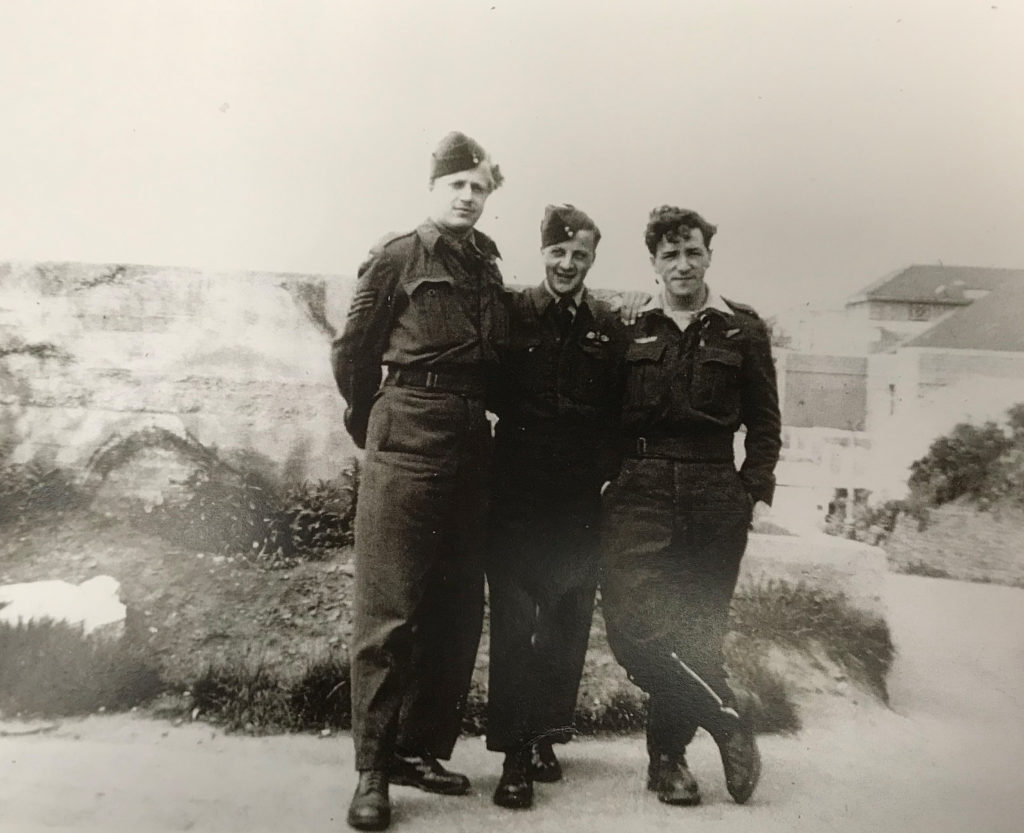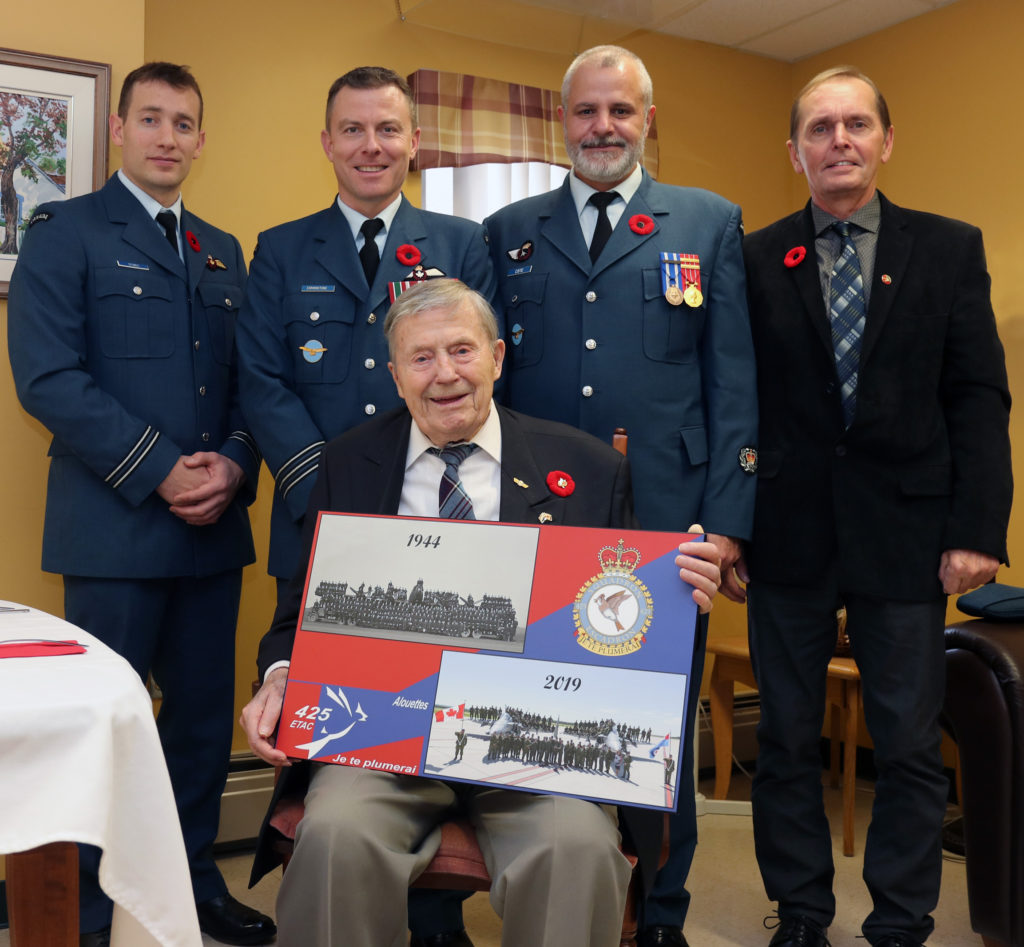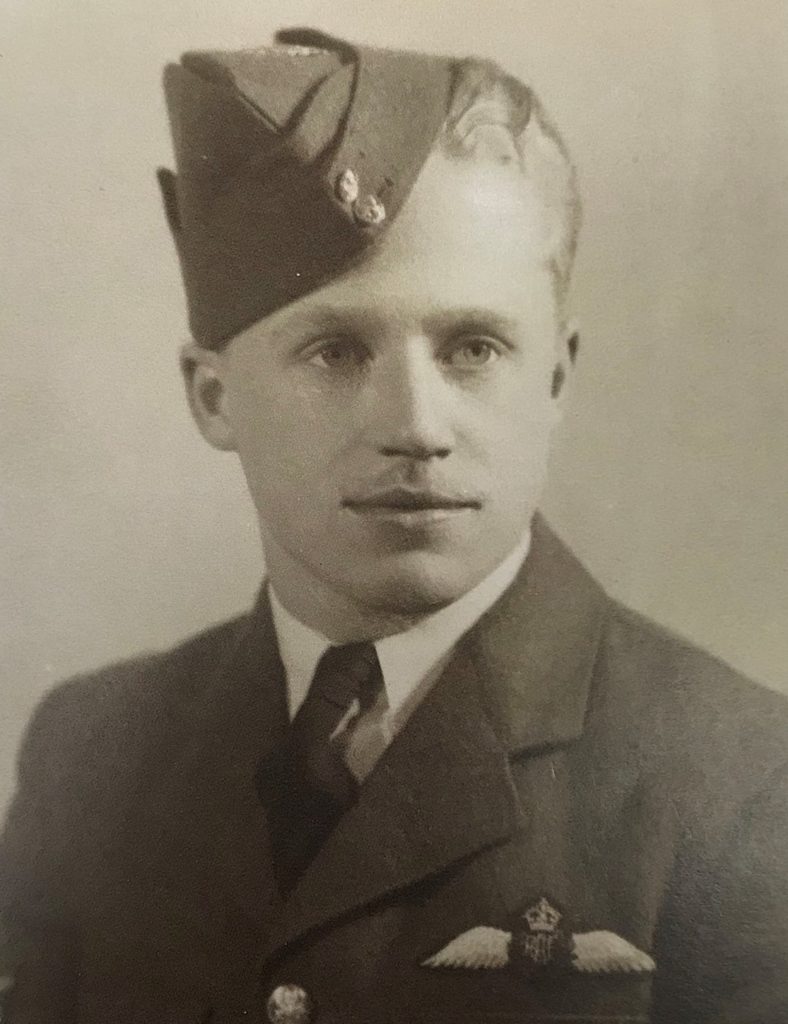Estimated reading time 11 minutes, 13 seconds.
It was Christmas Eve, Dec. 24, 1944. FSgt Jean Cauchy was the pilot of a Halifax bomber making a bombing run on Dusseldorf Airfield in Germany.

Hit by flak, the Halifax lost one of its engines. To make matters worse, there was still a bomb in the bomb bay that hadn’t released during the attack. Despite wanting to get to their home base for Christmas, and the Christmas concert in which he and many of his crew were scheduled to sing, he diverted the crippled, dangerously loaded aircraft to a new location, all while still being targeted by flak.
Remembrance Day 2019
Cauchy, born in Lévis, Que., in 1924, joined the Royal Canadian Air Force (RCAF) in 1942. He was 18, and had just learned that his brother Louis, serving with the Royal Air Force (RAF) as an air gunner, had been shot down during a bombing mission over Fortress Europe.
He received his pilot wings after a year and a half of training and, in January 1944, was transferred to Royal Air Force Station Tholthorpe in Yorkshire, England, to fly with the 425 Squadron — the “Alouettes.” He flew six missions on the Halifax Mark III Bomber during the Second World War before also being shot down on Jan. 5, 1945. He and his crew were captured by German forces and spent the remainder of the war at Stalag Luft I as prisoners of war until the camp was liberated by the Allies in May 1945.
After the war, Cauchy returned to Canada and was subsequently released from the military. He maintained close ties with 425 Squadron, and served as their honorary colonel from 1998 to 2001.
In 2019, he was unable to travel to Bagotville, Que., (the home base of the Alouettes) for the annual Remembrance Day service, so LCol Jody Edmonstone, 425 Squadron’s commanding officer, MWO Gino Coté, Capt Matt Stokes and Richard Girouard, the squadron historian, travelled to Quebec City to mark Remembrance Day with the 95-year-old Alouette and 60 other veterans at Maison Paul Triquet, a veterans’ residence where Cauchy lives.
After the service, Edmonstone asked Cauchy if he had ever experienced an engine failure while flying bombers during the war. Over the next two hours, an amazing story unfolded.

Christmas 1944
Christmas was quickly approaching at Tholthorpe, explained Cauchy. The squadron adjutant called for volunteers to prepare some events for a Christmas Eve celebration. Knowing Cauchy was an avid singer, the adjutant asked him to assemble a squadron choir to sing Christmas carols during Christmas dinner and other festivities. A reporter from Radio Canada would be present at the celebration to record the choir and broadcast it in Canada on Christmas Day. Time was short, so without delay, Cauchy quickly assembled what he considered to be a rather decent 425 Squadron choir. They held a few practices and he was satisfied they would be ready for the event.
As Christmas Eve approached, Cauchy learned the squadron was tasked with a bombing mission on Dec. 24. Most of the choir members would be involved in the raid. Fortunately, it was a day-time attack on Dusseldorf, which would allow them to return in time for the celebrations and, more importantly, their performance.
It was a cold and clear day with excellent weather for the raid. The formation of six Halifax bombers were able reach their target without opposition and drop their bombs at 2:55 p.m. Their raid was successful, leaving heavy damage on the enemy airfield. The 425 Squadron operations record book records that the target’s “runways severed in bomb bursts . . . Target area smoking. A good trip. Bombing concentrated and marking good.”
A few minutes later, however, the successful mission took an unexpected turn for the worse.
The formation route was planned to avoid known areas of anti-aircraft artillery fire — known as flak. At 3:02 p.m., Cauchy’s aircraft was targeted by an enemy battery, taking heavy damage to the right wing. They subsequently lost one of the four Halifax engines, but the aircraft was still able to fly and maintain altitude, although at a reduced speed. To make matters worse, the crew reported that there was still a bomb in the bomb bay that hadn’t released during the attack. The crew was now at risk of the bomb going off if they manoeuvred too aggressively or took further damage.
At the controls, Cauchy began weighing his options: return to Tholthorpe or divert to another base. The bomber formations always tried to maintain formation integrity so the gunners could better defend against enemy fighters. But now his Halifax was losing speed, and they were left behind — vulnerable to enemy attack.
In the chaos, Cauchy’s navigator, FO J.J.P. L’Esperance, came on the aircraft’s intercom, giving him a new vector (direction and speed) to divert to RAF Rivenhall, the closest base. It was often used by aircraft needing to divert after bombing raids. After consulting with L’Esperance again, and despite wanting to get everyone home for the Christmas celebrations, Cauchy realized that diverting to Rivenhall would likely be the safest option for his crew and aircraft. He turned the damaged bomber toward the divert field.
They were still being targeted by flak occasionally as they approached the English Channel and Cauchy manoeuvred his aircraft evasively to avoid any more damage — despite protests from the navigator and other crew. They were all very concerned about the unreleased bomb going off. If it was jostled loose in the bomb bay, they would all be done for! The crew shouted over the aircraft’s intercom that Cauchy should minimize manoeuvres, and he subsequently turned off the intercom off to silence his anxious crew. He needed to remain focused on flying the plane as smoothly as possible so as to not jostle the hung bomb and set it off prematurely — all while avoiding be hit by more flak. It was a perfect Catch 22.
Clearing the European coast and the flak batteries, he faced his next challenge of landing the Halifax without setting off the bomb. It had to be smooth or, again, they would be in big trouble. In the words of Cauchy, he lined up to the field and made the best landing of his life and “greased it on” to the grass runway at Rivenhall.
The control tower had him taxi far away from other planes and buildings due to their hung ordnance. Breathing a sigh of relief, Cauchy shut down the remaining three engines and the crew left the aircraft. Everyone had arrived safely.

Safe in Rivenhall for Christmas
The crew made their way into the station and realized there weren’t a lot of people around as many were on leave for the holiday. There was a pub near the base that was open, however, and they went there with several crews from other formations who had also diverted.
After a very stressful mission, the crews were happy to be served by the proprietor, described as “a beautiful red-headed English woman.” The crews enjoyed a few drinks until Cauchy and L’Esperance decided find a midnight Christmas mass. They wandered around until they found a nearby Roman Catholic Church. They knocked on the door despite the blackout conditions — which meant that all building, window and other lights were hidden or extinguished to prevent targeting by enemy bombers at night. A priest answered the door and asked what the two were doing there. They asked if there was going to be a midnight mass. Dumbfounded, the priest laughed and explained that they were under blackout conditions and haven’t had midnight mass in years, and that there wouldn’t be one that night either.
Resigned, the two aviators made their way back to the pub to rejoin their friends. Given there were no kitchen staff or meals available, some of the base duty personnel had been working to find food for the diverted crews. After an exhaustive search, the only thing they could come up with was Spam from ration packs. Far from the Christmas feast they had been hoping for, the crews made the best of their Christmas Eve at the pub with in the presence of their red-headed benefactor, some good English ale and not-so-good Spam.
A few days later, Cauchy and his crew made it back to RAF Tholthorpe. He quickly tracked down the reporter from Radio Canada, and asked if the choir had been able to sing without him and some of the other members — and how the recording had gone. The reporter told him that at the last minute an ad hoc choir had been assembled; they attempted to sing the carols, but unfortunately they were really not very good. On top of the poor vocals of the makeshift choir, the acoustics of the room made for a terrible recording. As a result, Radio Canada didn’t air the Christmas performance back home in Canada.
Always an Alouette
At the end of Cauchy’s wonderful story, the Alouettes had a tremendous laugh. No one would have thought the question, “Did you ever experience an engine failure?” would result in this remarkable story of wartime Christmas spirit and aviation excellence.








